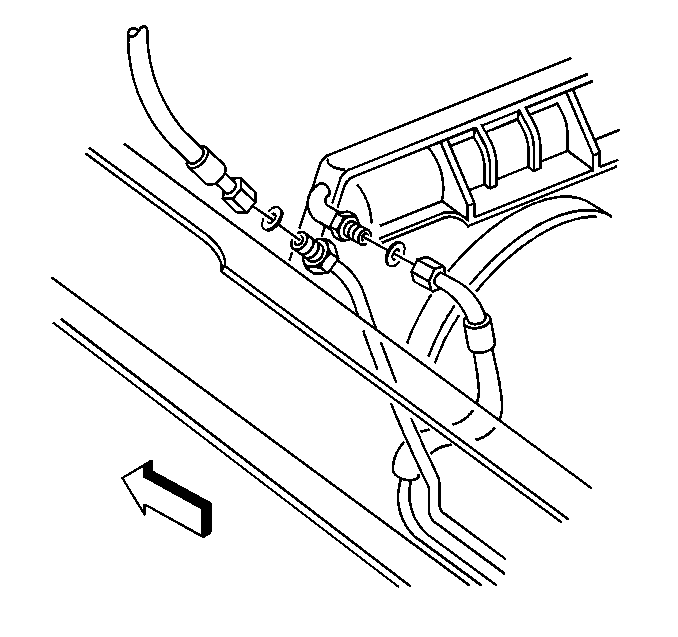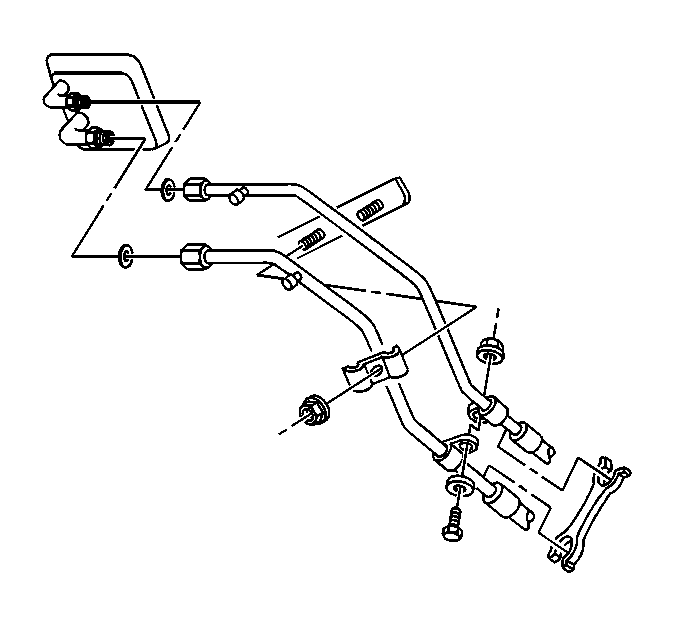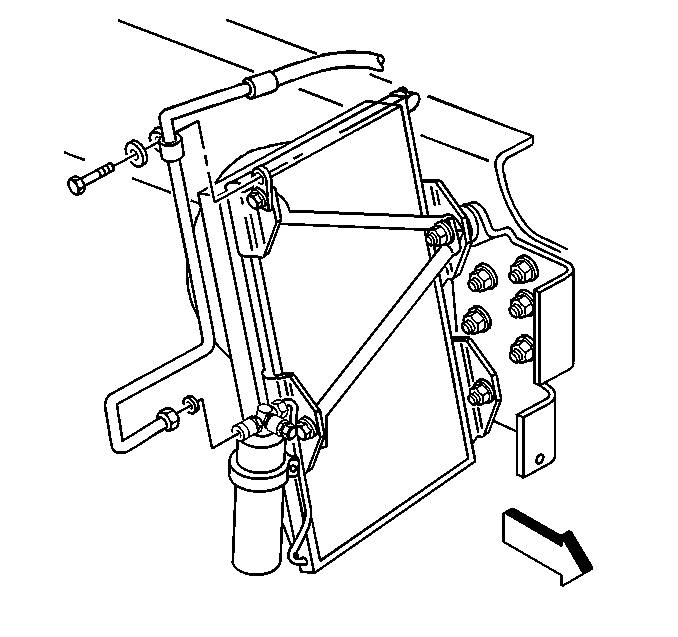Removal Procedure
- Disconnect the negative battery cables. Refer to Battery Replacement in Engine Electrical.
- Open the hood.
- Secure the hood.
- Discharge and recover the refrigerant from the system. Refer to Refrigerant Recovery and Recharging .
- Remove the low pressure hose at the A/C evaporator.
- Remove the O-ring seal.
- Remove the high pressure hose at the A/C evaporator.
- Remove the O-ring seal.
- Remove the following components from the bracket stud:
- Remove the following components from the A/C evaporator hoses:
- Remove the low pressure hose at the A/C receiver/dryer or dehydrator.
- Remove the O-ring seal.
- Remove the high pressure hose at the A/C condenser.
- Remove the O-ring seal.
Caution: Unless directed otherwise, the ignition and start switch must be in the OFF or LOCK position, and all electrical loads must be OFF before servicing any electrical component. Disconnect the negative battery cable to prevent an electrical spark should a tool or equipment come in contact with an exposed electrical terminal. Failure to follow these precautions may result in personal injury and/or damage to the vehicle or its components.
Discard the O-ring seal.
Discard the O-ring seal.

| • | The A/C evaporator bracket nut |
| • | The A/C evaporator hose bracket |

| • | The hose clamp nut |
| • | The washer |
| • | The bolt |
| • | The A/C evaporator hose clamp |

Discard the O-ring seal.
Discard the O-ring seal.
Installation Procedure
- Coat the new O-ring seal with R-134a Swash Plate P/N AIPDN 2-90188-300-0 refrigerant oil.
- Install the new O-ring seal into A/C condenser end of the evaporator hose.
- Fill the refrigerant hoses. Refer to Refrigerant Oil Distribution Specifications .
- Install the high pressure hose to the A/C condenser.
- Coat the new O-ring seal with R-134a Swash Plate P/N AIPDN 2-90188-300-0 refrigerant oil.
- Install the new O-ring seal into the A/C evaporator end of the A/C evaporator hose.
- Connect the low pressure hose to the A/C evaporator.
- Coat the new O-ring seal with R-134a Swash Plate P/N AIPDN 2-90188-300-0 refrigerant oil.
- Install the new O-ring seal into the A/C evaporator end of the A/C evaporator hose.
- Install the high pressure hose to the A/C evaporator.
- Install the A/C evaporator hose clamps to the A/C evaporator. Secure the clamps with the washer, the bolt and the nut.
- Install the A/C evaporator hose bracket to the A/C evaporator hose bracket stud. Secure the hose bracket with the nut.
- Connect the negative battery cables.
- Close the hood.

Notice: Use the correct fastener in the correct location. Replacement fasteners must be the correct part number for that application. Fasteners requiring replacement or fasteners requiring the use of thread locking compound or sealant are identified in the service procedure. Do not use paints, lubricants, or corrosion inhibitors on fasteners or fastener joint surfaces unless specified. These coatings affect fastener torque and joint clamping force and may damage the fastener. Use the correct tightening sequence and specifications when installing fasteners in order to avoid damage to parts and systems.
Tighten
Tighten the A/C evaporator high pressure hose fitting at the condenser
to 18 N·m (14 lb ft).

Tighten
Tighten the A/C evaporator low pressure hose fitting at the A/C evaporator
to 32 N·m (24 lb ft).

Tighten
Tighten the A/C evaporator hose clamp nut to 30 N·m (22 lb ft).
Tighten
Tighten the A/C evaporator hose bracket nut to 30 N·m (22 lb ft).
